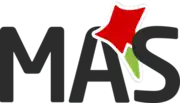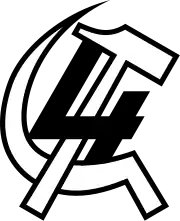Socialist Alternative Movement
The Socialist Alternative Movement (Portuguese: Movimento Alternativa Socialista, MAS), formerly known as the Left Revolutionary Front (Portuguese: Frente da Esquerda Revolucionária, Ruptura/FER) is a Trotskyist organization in Portugal. It was the Portuguese section of the International Workers' League (Fourth International)[1] until they split in 2017.[2] It ran on a joint list with the Madeira-based Labour Party in the 2015 parliamentary elections.
Socialist Alternative Movement Movimento Alternativa Socialista | |
|---|---|
 | |
| Abbreviation | MAS |
| Leader | Collective leadership |
| Founded | April 2000 |
| Preceded by | Left Revolutionary Front |
| Headquarters | Lisbon |
| Newspaper | Ruptura |
| Student wing | Ruptura |
| Ideology | |
| Political position | Left-wing |
| Colours | Red |
| Assembly of the Republic | 0 / 230 |
| European Parliament | 0 / 21 |
| Regional Parliaments | 0 / 104 |
| Local government | 0 / 2,086 |
| Website | |
| www.mas.org.pt | |
| Part of a series on |
| Trotskyism |
|---|
 |
The party was founded as the Left Revolutionary Front (FER) in 1983. This was dissolved in 2005 and merged with the student activist movement Ruptura (which was part of the Left Bloc) to form Ruptura/FER.
The party says in its constitution that "the fight against capitalist exploitation and all forms of oppression of human beings by a socialist democratic regime, for workers' power, to ensure the transition to socialism and communism. We understand by socialism a society in which power is exercised democratically by the workers and Communism a society without classes and without the state. This implies the rejection of the "experiences" of capitalism management spearheaded by the social democrats (PS governments) or of totalitarian regimes dominated by a single Stalinist party".
The party was renamed to MAS and registered as a party in August 2013 (a first attempt at registration in March 2013 was rejected, since its statute violated the assumptions required by the Constitutional Court).
See also
Notes
- Lisi 2013, p. 36.
- Administrador. "Declaração conjunta de MAIS (Brasil) e MAS (Portugal)". MAS (in European Portuguese). Archived from the original on 31 May 2019. Retrieved 13 December 2018.
References
- Lisi, Marco (March 2013). "Rediscovering civil society? Renewal and continuity in the Portuguese radical left". South European Society and Politics. 18 (1): 21–39. doi:10.1080/13608746.2012.757450. S2CID 155551865.